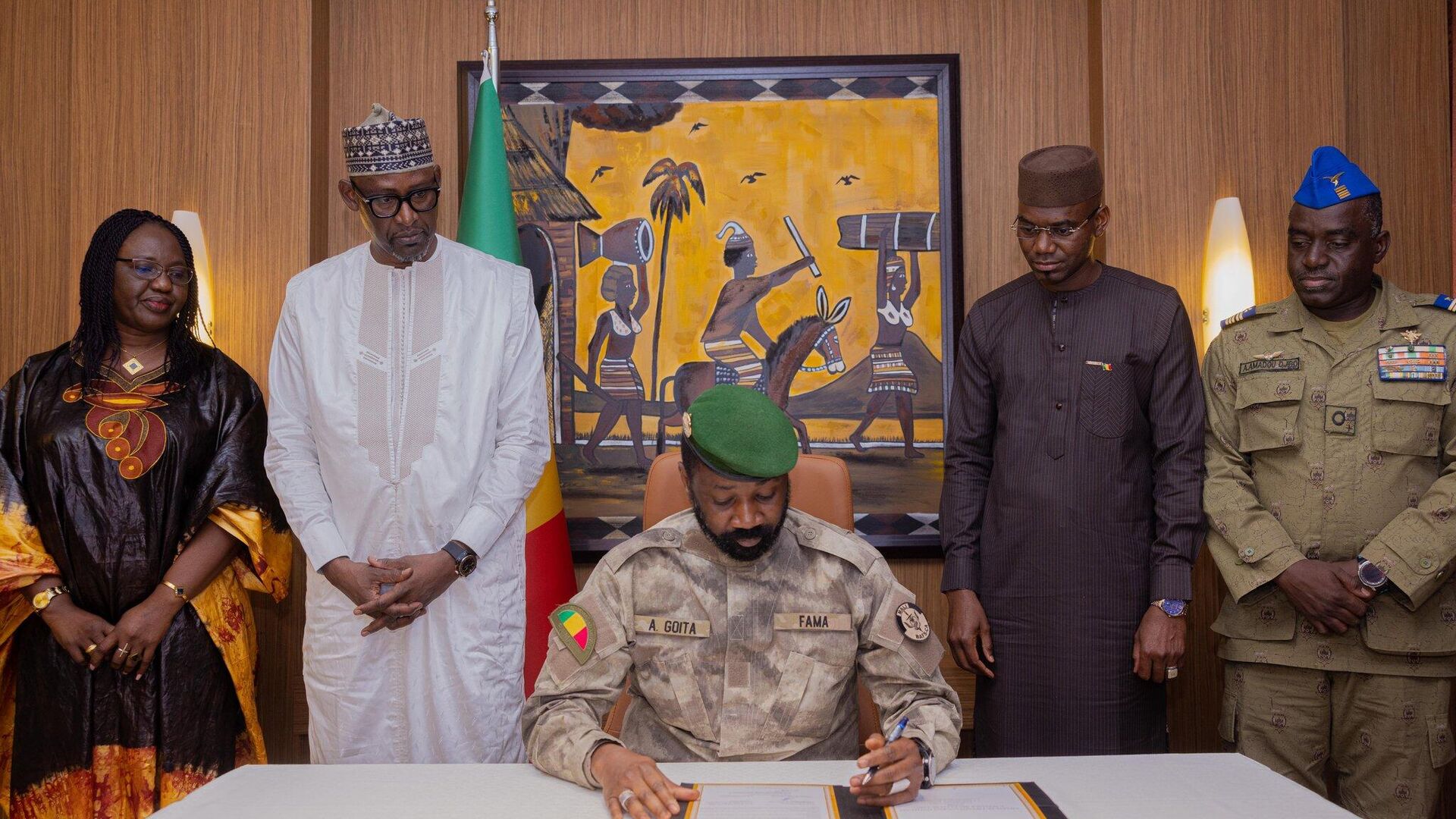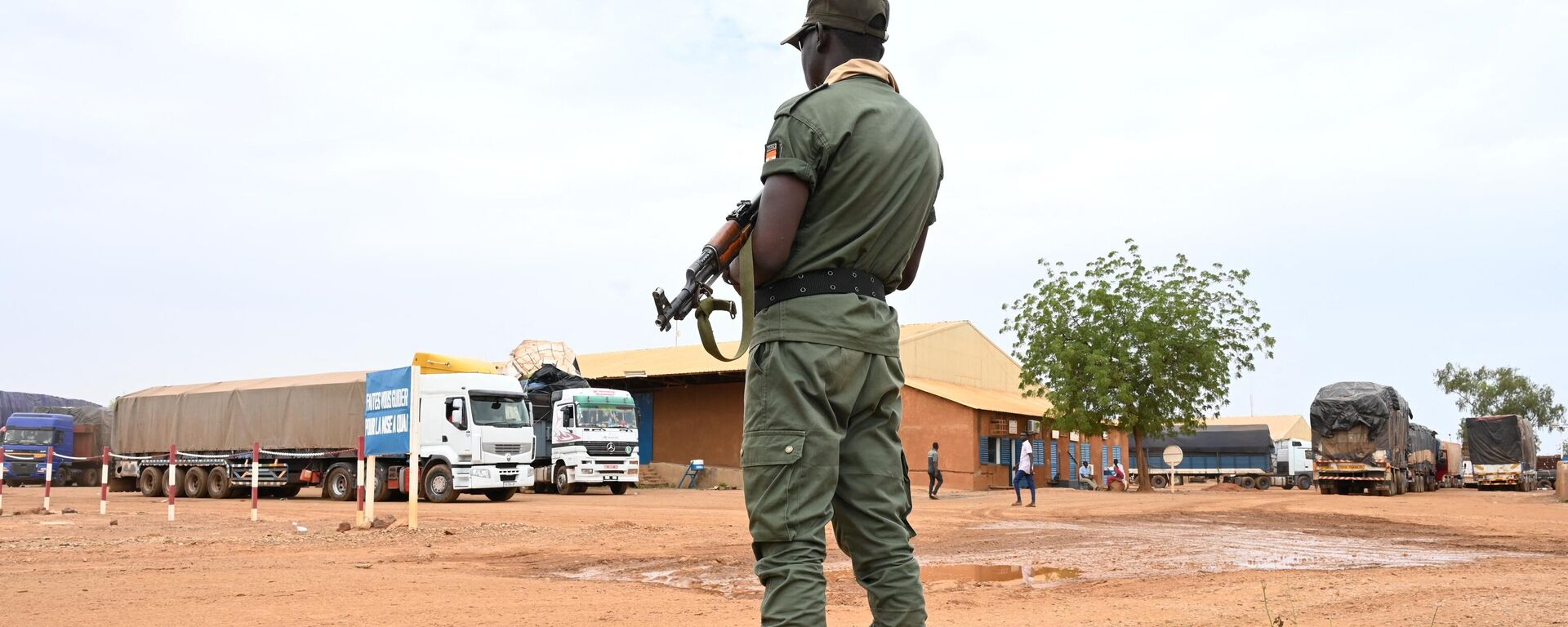https://en.sputniknews.africa/20230919/alliance-of-sahel-states-open-to-any-country-in-region-to-join-expert-says-1062221054.html
Alliance of Sahel States Open to Any Country in Region to Join, Expert Says
Alliance of Sahel States Open to Any Country in Region to Join, Expert Says
Sputnik Africa
On September 16, the military leaders of Mali, Burkina Faso, and Niger signed a charter to design the Alliance of Sahel States (AES) to "create a collective... 19.09.2023, Sputnik Africa
2023-09-19T18:13+0200
2023-09-19T18:13+0200
2023-09-19T18:13+0200
opinion
west africa
sahel
mali
burkina faso
mauritania
chad
niger
economic community of west african states (ecowas)
african union (au)
https://cdn1.img.sputniknews.africa/img/07e7/09/10/1062164090_0:88:2048:1240_1920x0_80_0_0_ccca965a87100f369608fce3fa1de988.jpg
The charter of the Alliance of Sahel States, which includes Mali, Burkina Faso and Niger, implies that the door to the newly-created bloc is open to other Sahel countries, Dr. Mady Ibrahim Kante, lecturer at the Faculty of Administrative and Political Sciences of the University of Legal and Political Sciences of Bamako, told Sputnik Africa.In particular, the researcher suggested, Chad and Mauritania could enter the alliance. Kante noted that Chad and Mauritania, like Mali, Burkina Faso and Niger, are also members of the G5 Sahel, which was created to coordinate security cooperation. In turn, the AES was designed for the same purpose, namely to strengthen cooperation in the fight against terrorism, as neither African Union nor ECOWAS "could get the solution for terrorism on the continent," the expert emphasized.The second goal of the organization, according to the lecturer, is the joint struggle of the Alliance countries against the influence of their former colonial master France.In addition, the Alliance countries united in the face of the threat of the ECOWAS intervention in post-coup Niger, the pundit believes. According to him, the unification of the three Sahelian countries complicates ECOWAS' determination to intervene in Niger, as the East African bloc will have to fight a war with three countries at once. Apart from that, the war in West Africa would cause extremist groups in the region to start spreading their influence to other countries such as Benin, Togo and Cote d'Ivoire, which also explains why ECOWAS "slowed down" the intervention, Kante argued.Earlier this year, Burkina Faso Prime Minister Apollinaire Kyélem de Tambela put forward a proposal for a "flexible federation" between his country and Mali.
https://en.sputniknews.africa/20230917/any-attack-will-be-considered-as-aggression-what-alliance-of-sahel-states-is-1062169944.html
west africa
sahel
mali
burkina faso
mauritania
chad
niger
Sputnik Africa
feedback@sputniknews.com
+74956456601
MIA „Rossiya Segodnya“
2023
Maxim Grishenkin
https://cdn1.img.sputniknews.africa/img/07e7/0a/17/1063018107_0:0:1104:1103_100x100_80_0_0_03090c85a11f5d2e8a19cf1d989443c9.jpg
Maxim Grishenkin
https://cdn1.img.sputniknews.africa/img/07e7/0a/17/1063018107_0:0:1104:1103_100x100_80_0_0_03090c85a11f5d2e8a19cf1d989443c9.jpg
News
en_EN
Sputnik Africa
feedback@sputniknews.com
+74956456601
MIA „Rossiya Segodnya“
Sputnik Africa
feedback@sputniknews.com
+74956456601
MIA „Rossiya Segodnya“
Maxim Grishenkin
https://cdn1.img.sputniknews.africa/img/07e7/0a/17/1063018107_0:0:1104:1103_100x100_80_0_0_03090c85a11f5d2e8a19cf1d989443c9.jpg
west africa, sahel, mali, burkina faso, mauritania, chad, niger, economic community of west african states (ecowas), african union (au), terrorist attack, africa insight
west africa, sahel, mali, burkina faso, mauritania, chad, niger, economic community of west african states (ecowas), african union (au), terrorist attack, africa insight
Alliance of Sahel States Open to Any Country in Region to Join, Expert Says
On September 16, the military leaders of Mali, Burkina Faso, and Niger signed a charter to design the Alliance of Sahel States (AES) to "create a collective defense architecture" amid members' deteriorating relations with France and the Economic Community of West African States (ECOWAS) following the July coup in Niger.
The charter of the Alliance of Sahel States, which includes Mali, Burkina Faso and Niger, implies that the door to the newly-created bloc is open to other Sahel countries, Dr. Mady Ibrahim Kante, lecturer at the Faculty of Administrative and Political Sciences of the University of Legal and Political Sciences of Bamako, told Sputnik Africa.
"The membership door is open for other countries in the Sahel [...] If we look at the official agreement, there is no article that blocks another country from becoming a member of this. It will be probably open for all of the countries of the Sahel to become members of this alliance," the expert argued.
In particular, the researcher suggested, Chad and Mauritania could enter the alliance. Kante noted that Chad and Mauritania, like Mali, Burkina Faso and Niger, are also members of the G5 Sahel, which was created to coordinate security cooperation.
In turn, the AES
was designed for the same purpose, namely to strengthen cooperation in the fight against terrorism, as neither African Union nor ECOWAS "could get the solution for terrorism on the continent," the expert emphasized.
The second goal of the organization, according to the lecturer, is the joint struggle of the Alliance countries against the influence of their
former colonial master France.
"These countries [of the AES] have problems with France, so they try to be in collaboration to face against any endurance and influence of France in these three countries," Kante stressed.
In addition, the Alliance countries united in the face of the threat of the ECOWAS intervention in post-coup Niger, the pundit believes. According to him, the unification of the three Sahelian countries complicates ECOWAS' determination to intervene in Niger, as the East African bloc will have to fight a war with three countries at once.
Apart from that, the war in West Africa
would cause extremist groups in the region to start spreading their influence to other countries such as Benin, Togo and Cote d'Ivoire, which also explains why ECOWAS "slowed down" the intervention, Kante argued.
Speaking about the prospects of the AES, the expert opined that in the future, provided that the fight against terrorism is successful, the members may consider the formation of a federation, which, on a larger scale, could then move to the whole continent in the spirit of Agenda 2063, which proposes to go towards regional integration and then continental integration.
Earlier this year, Burkina Faso Prime Minister Apollinaire Kyélem de Tambela put forward a proposal for a "flexible federation" between his country and Mali.



